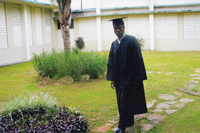Just as the Carondelet-Markham Memorial Presbyterian Church here was experiencing its own rebirth by welcoming the gifts of Liberian refugees into the life of the congregation, one young member was at the same time undergoing his own personal and spiritual transformation.
David Zweh, who had lived as a Liberian refugee in an Ivory Coast refugee camp for 14 years, had joined a wave of 15 Liberian immigrant families in 2005 to make Carondelet-Markham his church home. “I love the members of the church and they love me,” Zweh said. “We are in Christ and will remain in Christ for the rest of our lives.”
Having previously served in Liberia as a student pastor in the Lutheran Church, Zweh felt called to a leadership role in the Presbyterian Church (U.S.A.) in this growing, multicultural congregation. The Rev. Susan Finley, pastor of Carondelet-Markham, encouraged Zweh by introducing him to the Rev. Angel Suarez-Valera, associate for New Immigrant Congregational Support in the Racial Ethnic and Women's Ministries/Presbyterian Women ministry area of the General Assembly Mission Council (GAMC).
“When I asked Pastor Susan how can we advance ourselves in leadership, she told me to talk to Angel,” Zweh said.
Suarez-Valera told Zweh about his hope of designing a theological education program for new immigrants in response to the increasing needs for culturally proficient pastoral leadership in congregations like Carondelet-Markham. “The blessing of having new Presbyterians from Africa, Asia, the Middle East, Latin America, the Caribbean, and Eastern Europe has resulted in a need among Presbyterians in the U.S. to provide the necessary theological formation to and with the new communities of faith,” said Suarez-Valera.
When Suarez-Valera again contacted Zweh in January 2007, it was to tell him that the new training program had been approved — with funding for up to ten students — and that Zweh would be offered a full tuition scholarship from the GAMC to secure his place. “In hearing the call to leadership in the Presbyterian Church, it was wonderful to me to get into such a program advancing me in my theology,” Zweh said. “I was so much encouraged to be a part of it.”
In May 2009, Zweh was one of ten graduates of the two-year pilot project, which was programmed in cooperation with the Evangelical Seminary of Puerto Rico, where the graduation ceremony was also held. The class — composed of African, Asian, and Latino immigrants — attended a total of eight individual sessions of weekend instruction at Stony Point Center in New York.
With an emphasis on Reformed theology and Presbyterian polity, the program’s goal was to prepare each candidate for possible service as a commissioned lay pastor.
Alongside Carondelet-Markham, Zweh’s home presbytery, the Presbytery of Giddings-Lovejoy, has been a constant source of support — both spiritual and financial — throughout the process.
“David Zweh is the first refugee leader in our presbytery to become an elder and to complete a training program for lay pastor work,” said the Rev. Amy Fowler, associate executive presbyter for congregational development. “The change I have seen in him is dramatic. His confidence as a leader of a faith community has increased exponentially.”
In Zweh’s experience with this singular initiative, Fowler sees something even more significant. “The General Assembly gave David a scholarship for the tuition, the Congregation Development Ministry Team of the presbytery paid for him to travel to Stony Point for the classes, and the congregation helped pay his incidental expenses,” she said.
“We count this as a marvelous example of the power of the connectional church. Together, we are preparing and nurturing leaders for the people living in our midst. We have all been in this together, and I think God is delighted by it!”
View a short video on Carondelet-Markham, "That Kind of Servanthood Really Changes Lives.”
For a related story on Carondelet-Markham, please see the October 2009 issue of Presbyterians Today.
“One in the Spirit” is a monthly e-newsletter from General Assembly Mission Council Executive Director Linda Valentine to middle governing body and other church leaders.

